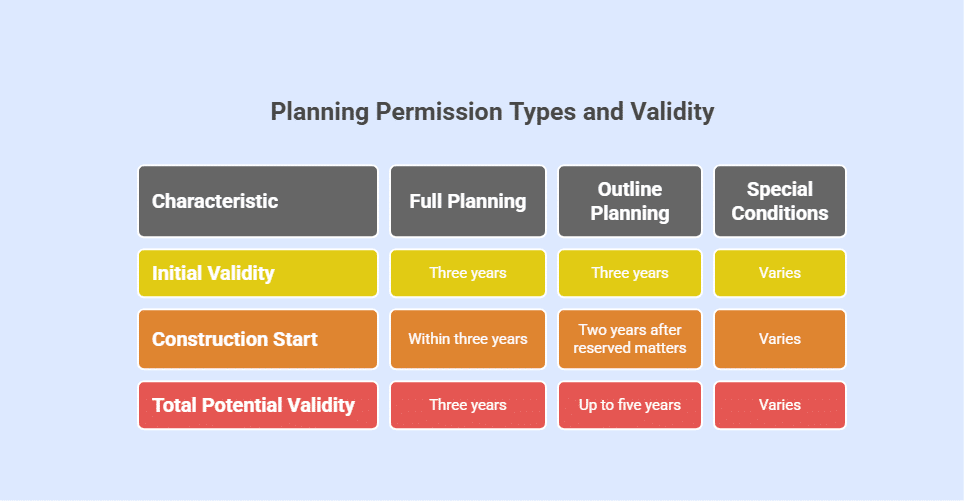Got planning permission, but now wondering how long it actually lasts?
You’re not alone. After all the effort of getting approval for your project, whether it’s a sleek extension, a new home, or something more ambitious, it’s easy to assume that permission lasts forever. Unfortunately, it doesn’t. And if you miss the deadline, you might have to start the whole process again.
In this article, we’ll explain how long a planning application is valid for in the UK, what it really means to “start work,” and what to do if your time’s running out. It’s everything you need to stay on track, and stay legal.
Understanding Planning Permission Validity
So, how long is your planning permission valid in the UK? In most cases, the answer is simple: three years from the date your application is approved.
That means you’ve got a three-year window to start building. But here’s the important bit, “start” doesn’t mean finish your designs or order materials. You need to begin actual, physical work on the site before that deadline. If you don’t, the permission expires, and you’ll likely need to submit a fresh application.
It’s also worth noting that the clock starts ticking from the date the local planning authority grants permission, not the day you receive the letter, and not when you feel ready to start.
Local councils rarely send reminders, so it’s on you to keep track. If you’re unsure of your approval date or conditions, it’s best to check the decision notice carefully or speak with your architect or planning consultant.


Types of Planning Permission and Their Validity Periods
Not all planning permissions are created equal. In the UK, the validity period can vary slightly depending on the type of planning permission you’ve received. Let’s break it down:
Full Planning Permission
This is the most common type for homeowners and developers alike. It’s valid for three years from the date of approval. To keep it active, work must begin within that timeframe, and we mean actual construction, not just paperwork or planning meetings. If no work has started, you’ll need to reapply.
Outline Planning Permission
This is usually used for larger or more complex projects. It gives approval in principle, but you’ll still need to submit ‘reserved matters’, things like layout, access, appearance, etc., within three years.
Once the reserved matters are approved, you then get two more years to start construction. So, in total, you could have up to five years, but only if you follow the right steps at the right time.
Special Conditions or Variations
Sometimes, a local council may attach specific conditions that change the time limits, either shorter or longer. Always read the decision notice carefully. It’s not fun, we know, but it’s crucial to avoid nasty surprises down the line.
What Constitutes Commencement of Work?
Now that we know you need to start work within the planning permission period, the next logical question is, what actually counts as “starting”?
According to UK planning law, simply ordering materials or making plans doesn’t cut it. You need to carry out a “material operation” on the site. That sounds technical, but in plain English, it means you must physically begin building work that can be clearly shown to your local council.
Here are a few examples that usually count as commencement:
- Digging foundations
- Laying underground pipes or drainage systems
- Pouring concrete bases
- Demolishing existing buildings on the site
On the other hand, actions like clearing vegetation or putting up a sign probably don’t qualify.
If you’re ever in doubt, speak to your local planning authority or ask your architect to help confirm. It’s a small step that can save you from losing your planning approval and having to reapply from scratch.
Consequences of Expired Planning Permission
Missing the deadline on your planning permission isn’t just frustrating, it can be costly and time-consuming too.
If you haven’t started meaningful work before the permission expires, it becomes invalid. That means you’ll have to submit a brand-new application and wait all over again for approval. And there’s no guarantee you’ll get it a second time.
Why? Because planning policies change. What was acceptable three years ago might now fall foul of new rules or local objections. Councils may have updated their development plans, or there could be new environmental or heritage restrictions in place. You might also face increased application fees, additional documentation requirements, or requests for updated surveys.
It’s not just red tape, reapplying can delay your project by months, possibly longer. That’s why it’s so important to track your permission’s expiry date and get moving in good time. Planning ahead (pun intended) really does pay off.
Can Planning Permission Be Extended or Renewed?
You can’t simply extend or renew planning permission by applying for more time. Once your permission is granted, it usually lasts for three years, and if you don’t start work within that period, the permission will expire.
If your planning permission expires, you’ll need to submit a new application and go through the whole approval process again. This can mean delays, additional costs, and there’s no guarantee the new application will be approved under the same terms.
Occasionally, temporary measures, like those during the COVID-19 pandemic, have allowed automatic extensions, but these are rare and short-term.
The best advice? Start work before your permission expires, even if it’s just laying the foundations. This usually keeps your permission valid. If you’re unsure about your deadlines or how to proceed, consult your planning consultant or architect sooner rather than later. Acting early can save you time and hassle.
Tips to Ensure Your Planning Permission Remains Valid
To avoid the hassle of expired permissions, here are some practical tips:
- Start work promptly. Once your permission is granted, try to begin physical work as soon as possible. Even small steps like laying foundations count.
- Keep records. Take photos and keep documents showing when work started, it could help prove your case if there’s any dispute.
- Stay in touch with the council. If you’re unsure whether your work counts as commencement, check with your local planning authority early on.
- Get professional help. Architects or planning consultants can guide you through the process and help ensure you meet deadlines and conditions.
Final Words
Understanding how long your planning permission lasts is vital to keep your project on track. Remember, you usually have three years to start work, and missing that can mean delays and extra costs. Stay organised, start early, and don’t hesitate to ask professionals for advice if you need it.
Ready to Make the Most of Your Planning Permission?
At Noades Architects, we guide clients through every stage of the planning and design process, helping you avoid delays, meet deadlines, and navigate any conditions set by your local authority. Whether you’re building a new home, planning an extension, or refurbishing an existing property, our expert team is here to help you make the most of your approval period.



